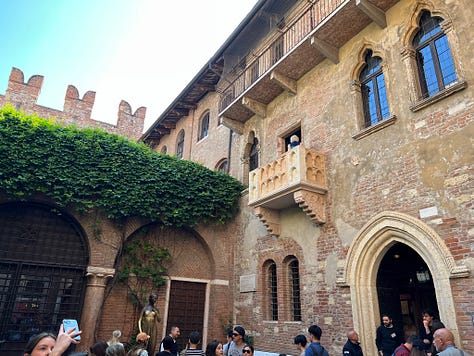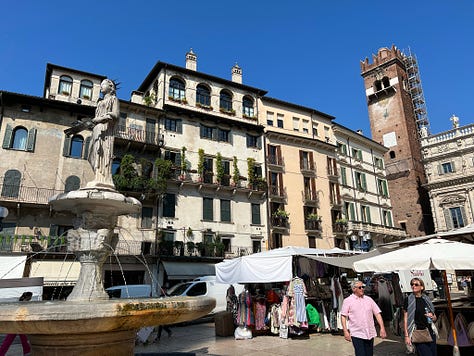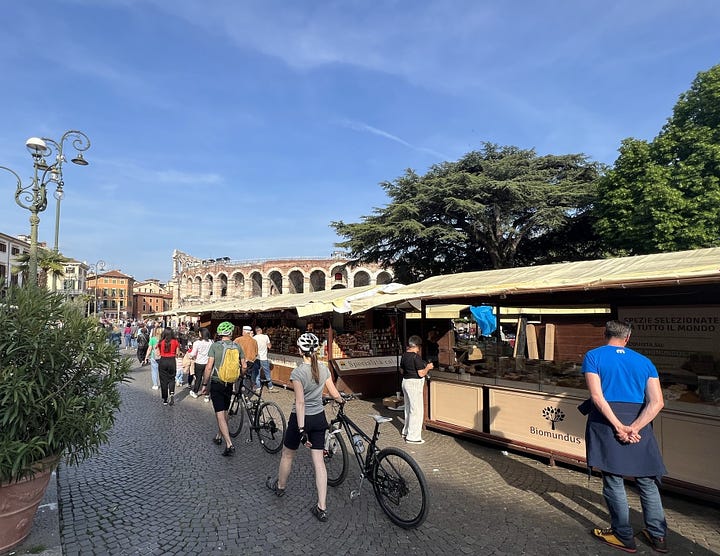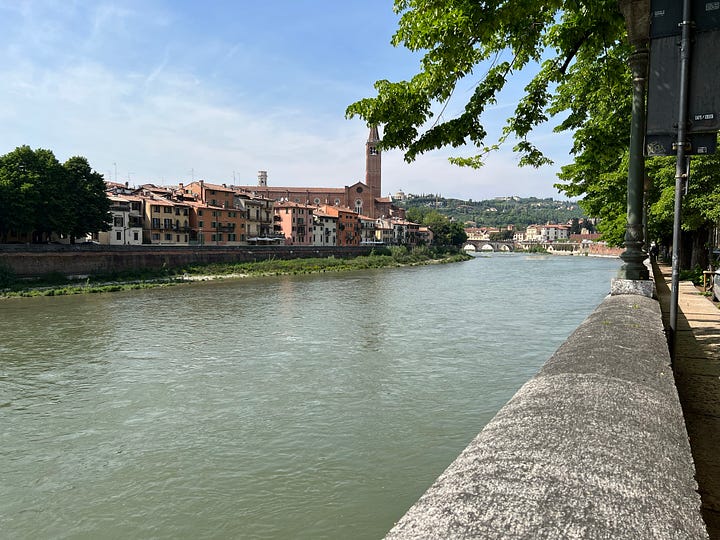1.
Our bed and breakfast was on the top floor of a four-story apartment building.
The meandering Adige River, which cradles Verona’s old town in an upside-down U shape, ran alongside the busy road our building let out onto. It was half past seven in the morning and my girlfriend and I were making plans for the day between bites of the breakfast of yogurt, toast, and fruit set out by our host.
As I pulled my spoon away from my mouth, I looked across the table and asked in a muffled tone with a mouthful of yogurt, “Do you hear that?” She replied: “Yeah, someone sounds angry. I think it’s coming from outside.”
I assumed it was a moped driver cursing at a car that cut him off. But the drawn-out legato tones that give Italian its recognizably romantic rhythm were replaced by Angry. Staccato. Bursts. Stabbing like ice picks at our groggy morning ears.
We stopped talking and tried to gauge how nearby the source of the noise was. But it eventually subsided so we continued eating as I made my case, while my girlfriend dismissively rolled her eyes, that the Romeo and Juliet balcony is a fictitious tourist trap not worth paying a penny to see.
A few minutes later the yelling intensified. It was clearly coming from inside our building.
“I’m going to check it out,” I said as I pushed back from the table and strode to the front door of our apartment, my heart shooting five beats higher with each step.
I unlatched the bolt, unhooked the chain, and pulled back the heavy metal forest green door. Down one flight of winding white marble stairs cordoned in with a decorative wrought iron railing, a domestic dispute had migrated onto the landing of the apartment below us.
A middle-aged Italian man with thinning slicked back hair, wearing nothing but a sleeveless white tank, boxer shorts, slippers, and a gold chain ironically adorned with a gold crucifix pendant was screaming at his wife and daughter. As I opened our door, he was jabbing a threatening finger into his wife’s chest while his daughter quivered and hid behind her mom.
“HEY!”
I yelled with an aggressive assertion that surprised even me as I bolted down the stairs towards them.
Once I reached the landing they were standing on, I changed my tone to that of a calm mediator, trying not to let my voice waver in trepidation as cortisol flooded every neuron and nerve ending in my body.
I looked directly at the man: “Don’t touch them.”
He continued his tirade towards his family while refusing to look at me. Of course, he had no idea what I was saying. But with my arrival, he lost the courage he had previously possessed to put his finger through his wife’s chest.
I stood between them, acting as the physical barrier the mother and daughter needed to escape. Once they fled down the stairs and out of sight, the man retreated inside his unit and I walked back up the stairs to our apartment door where my girlfriend had been watching the whole time.
Thirty minutes later, after my heartbeat returned to normal, we left to start our day exploring Verona.
The mother and daughter were standing like they’d just stumbled out of a car crash on the sidewalk by the entrance to the building. I offered a warm smile in an attempt to comfort them. They timidly met my gaze and mustered, “Grazie, thank you.”
2.
As we walked around Verona, the morning’s incident looped in my head.
By intervening, I could’ve gotten physical with the man. If I hurt him, I might be in trouble with the police. Or the mafia. He could have pulled a knife or threw a punch. I could have been sent to the hospital or, if I was very unlucky, killed.
But in the moment, I hadn’t thought about all the things that could have gone horribly wrong. I just acted. My mind was blank, subservient to some human instinct deep from within. An instinct I didn’t know existed, or had forgotten about until the very moment I needed it, took control.
I didn’t decide to leave the cozy breakfast table to investigate the shouting. I wasn’t consulted about the decision to bolt down the stairs in an attempt to help. If I had stepped outside of instinct in those moments, I probably would have recognized the risks and chosen not to help.
But I was not consciously choosing.
We think we’re always in control, but some situations choose our actions for us. My instinct to act that day is an instinct that flows through all of us. It has to. It’s the human instinct.
The human instinct is triggered before our mind has time to catch up and overrule it with rational decision-making. It’s the invisible instinct that, like Bruce Banner becoming the Hulk, lives by the doctrine of necessity and only emerges when we need it to. It’s the instinct that lets us overcome obstacles our bodies are capable of handling but that our brains would blow a fuse processing if we tried to think, rather than act, our way through them.
My mind didn't save that mother and child, my human instinct did.
But what about the Italian man abusing those he’s supposed to love and protect? Is he just a wretched soul?
He might be.
If he made the conscious choice to abuse another human being, it would be hard to call him anything but a monster. But what if the dark side of human instinct had possessed him in that moment?
There is an unignorable duality to our humanness. Just as I was called to do good without thinking, he may have felt threatened or scared and discharged his anger without conscious thought.
If he decided to be physical with me, the same instinct that sent me bolting down the stairs to help two people would have done everything in its power to beat him down until I could flee to safety. I was only capable of standing up for a woman and her child because I shared the same ability to deploy violence as that man.
Having the capacity for power, strength, and aggression and control over how you unleash it is what allows you to help others.
We both possessed the first. But that man lacked the second.
With love,
Thank you
and for your incredibly useful feedback on early drafts of this piece.Subscribe for new stories every Thursday:
Our Verona Expedition:





Quote I’m pondering:
Gregory David Roberts in his novel, Shantaram:
Now, long years and many journeys after that first ride on a crowded rural train, I know that the scrambled fighting and courteous deference were both expressions of the one philosophy: the doctrine of necessity. The amount of force and violence necessary to board the train, for example, was no less and no more than the amount of politeness and consideration necessary to ensure that the cramped journey was as pleasant as possible afterwards.
What is necessary? That was the unspoken but implied and unavoidable question everywhere in India. When I understood that, a great many of the characteristically perplexing aspects of public life became comprehensible…
Shantaram has quickly become one of my favourite books. Ever.
Thanks for reading!
1 — Leave a like. I’d be grateful if you’d consider tapping the “heart” ❤️ at the top or bottom of this page.
2 — Let’s chat. If this resonates or you want to share your thoughts, please leave a comment on this post. I’d love to hear from you and I respond to everyone!
3 — Share the love. If you know someone who may enjoy reading this, please share it with them.
P.S. If you want to reach me directly, you can respond to this email or message me on Substack Chat.






Love the way you confronted that bully and supported his wife and daughter. Courage is when one’s words or actions support another’s wellbeing with no benefit to yourself. Very courageous! Interesting, in that infintisimal moment of choice, you choose to act rather than turn away. Proud Dad moment once again. Also quite happy he didn’t have a knife……
Jack, I'm so glad you've followed your instinct to fall into the lap of your stories and share them. There is a kind of assertiveness in sharing oneself as a writer, confidence that your life experience has value, both to yourself and to others, that I think arises from the same protective instinct. There is a kind of fierce caretaking that shadows useful experiences and stands up for them by communicating them. That to me is the spirit of a storyteller, and you have it! I'm celebrating your recent shift to this focus as a creator. In my experience you're built for this.
"But the drawn-out legato tones that give Italian its recognizably romantic rhythm were replaced by Angry. Staccato. Bursts. Stabbing like ice picks at our groggy morning ears."